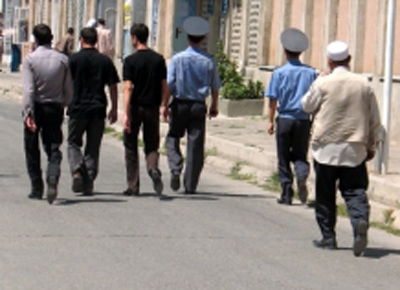Freedom from Torture
Civil Society Coalition against Torture and impunity in Tajikistan

Amnesty International has announced a report chronicling routine torture and abuse in detention centers throughout Tajikistan.
The full report, entitled “Shattered Lives: Torture and Other Ill-Treatment by Law Enforcement Officials in Tajikistan” takes an in-depth look at the treatment of those held in police custody.
“The torture methods used by the security forces are shocking: involving electric shocks, boiling water, suffocation, beatings, burning with cigarettes, rape and threats of rape - the only escape is to sign a confession or sometimes to pay a bribe ,” said Rachel Bugler, Amnesty International’s expert on Tajikistan.
“Such treatment leaves victims suffering not only from the physical injuries such as burst ear drums, broken teeth, dislocated jaws; but also from the symptoms of post-traumatic stress such as depression, chronic insomnia, and nightmares. Their ill-treatment has lasting repercussions on their lives and the lives of their families.
“Far too frequently this treatment leads to the deaths of people in police custody, and these cases are not being properly investigated and the alleged perpetrators are not effectively brought to justice.”
As torture has only recently been introduced into the criminal code as a crime, official statistics do not reflect the extent of the problem. This is exacerbated by the fact that victims of torture and their families are often afraid to speak out about torture, and suffer intimidation from police officials when they do.
Torture can affect anyone in Tajikistan but vulnerable members of the population such as those living in poverty who are less likely to lodge complaints are at particular risk.
In Tajikistan the incentives for police officers to use torture and other ill-treatment are often stronger than the deterrents. Most law enforcement officials continue to be unofficially assessed according to the number of crimes they solve.
Police abuse and corruption often go hand in hand. A local journalist told Amnesty International: “Torture is a means of income. Police detain, torture and charge people, and then suggest that they can be bought off.”
Human rights are violated in the pursuit of groups perceived as a threat to national security and members of Islamic movements and Islamist groups or parties are at particular risk of torture and ill-treatment.
People forcibly returned or extradited from other countries to Tajikistan have been subjected to torture or other ill-treatment after return.
Independent journalists are often intimidated by security forces when they report on allegations of torture and other ill-treatment.
“Senior government officials frequently state their commitment to human rights, to the protection of human rights, the rule of law and order. However, in the face of reality these words ring hollow,” said Rachel Bugler.
Safeguards against torture are often not implemented in practice - detainees are routinely held incommunicado while initial interrogations are conducted, often without a lawyer.
There is no reliable system of independent medical investigation of torture allegations: judges routinely ignore torture allegations at trial and information obtained through torture is admitted as evidence in the trials of those detained.
“Impunity for torture or ill-treatment has long been the norm in Tajikistan. And that will continue to be the case unless there’s an end to the institutional collusion that permits such abuses to occur. There is an urgent need for a clearly defined independent institution that will act as a check and a balance to the actions of security forces,” Bugler said.
“Notifying detainees of their rights at the moment of detention, informing family members, contacting a lawyer and registering the detention, maintaining proper detention records can provide key safeguards against torture and other ill-treatment in custody.
“These are the steps that will bring Tajikistan closer to the rule of law and closer to fulfilling its international obligations. They will also help build the trust of the public in its police force which is supposed to act in their service.”